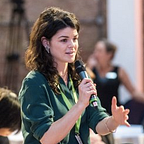What we’ve learnt building 100 startups from scratch
Today we announced that Entrepreneur First has raised a $12m funding round. We are lucky to welcome some of the world’s best investors — Greylock Partners, Mosaic Ventures, Founders Fund, Lakestar — and entrepreneurs — Reid Hoffman (LinkedIn), Demis Hassabis and Mustafa Suleyman (DeepMind) to the EF family. I’m also particularly excited to have EF alumni Rob Bishop & Zehan Wang (Magic Pony Techonlogy) and Bryan Baum (Represent) taking part in the round.
My co-founder Matt and I felt this was a good opportunity to reflect on the company we are building and what we have learnt developing a new model for startup creation.
Unlike any other investor, we invest in individuals before they have a team, or an idea. EF shifts your odds of building a globally important company, by helping you find an exceptional cofounder, develop a high value, high growth idea and access some of the world’s best investors.
When we started in 2011, our model had never been seen before. There was a lot of scepticism about whether it could work. We knew there should be an alternative path to help the world’s most ambitious individuals become entrepreneurs.
Six years later, we’ve built 100+ startups, had two >$100m exits and have seen 60% of our seed funded companies reach Series A. It works. And this is what we have learnt.
1. Founder potential > idea
We select individuals based on their founder potential — for us this means a mixture of their ambition, skills, motivation and contrarianism. We do ask individuals about ideas, but this is so we can see how they critically think. We have experimented with selecting based on ideas and found it far less effective than selecting individuals based on their merit.
2. Good ideas aren’t obvious
One of the reasons we select based on founder potential is because many of the ideas individuals come up with are the same — often based on problems they experience in their daily lives, such as food delivery or dating. This often forgets their personal competitive advantage that they’ve been developing through their careers. We call this your edge. We find that many of our most successful companies use one of their founder’s edges.
3. Team building works with a network and norms
EF is a network of the world’s most ambitious entrepreneurial individuals — we call it a concentration of outliers. We carefully screen and select before we invite you to join one of our cohorts. This means you know you are surrounded by potential cofounders who are outlier talent like you — exceptional in many different ways. We’re delighted to have Reid Hoffman join the EF board to learn from his experience building one of the world’s most valuable networks, LinkedIn.
The network is the first ingredient required to make team building work. The next is creating new social norms to enable quick testing and experimentation with different cofounders. Social norms can make testing cofounding teams a long and emotionally exhausting process. At EF we create new norms to encourage founder liquidity and new team creation. Read more about EF team building here.
4. Funding for individuals is both possible and necessary
Before EF existed, to get funded you needed two things; a team and an idea. This is possible while working in a job, or still in academia. But it’s hard. A lucky few can take time off and live on alternative income and this reduces the diversity you see in founders’ backgrounds.
At EF, we believe that if you are one of the world’s most ambitious individuals there should be no barriers to starting your own company. This is why we give each individual a stipend of £2,000 (UK)/S$5000 (Singapore) a month during our team building and ideation phase. It gives you the time and space to experiment while reducing worries about financial pressures. You can read more about our recent changes to our stipend in London here.
This is just the start
EF is now in London and Singapore supporting hundreds of people each year to build their own startup. We’re excited for the next chapter of EF, super charged with our new team.
Alice Bentinck is Co-Founder of Entrepreneur First (EF.) EF runs full-time programmes that fund the most talented scientists, engineers, developers and industry experts to find a co-founder, then helps those teams grow their businesses and raise funding. We’ve built >100 companies worth >$1B so far.
We currently run programmes in Berlin, Singapore and London, you can apply here or sign up below to get advice from the EF team on your startup journey.
